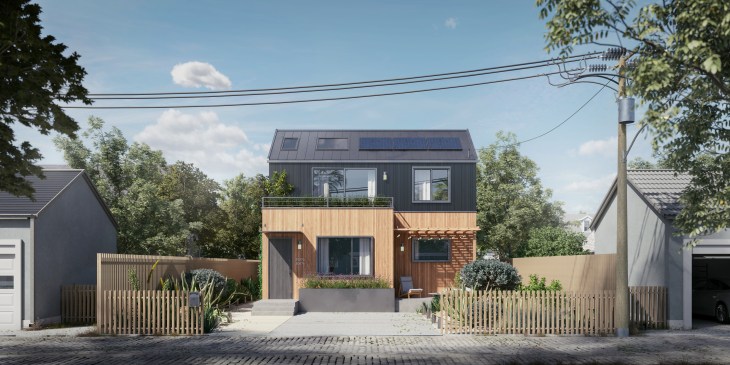W
elcome to the TechCrunch Exchange, a weekly startups-and-markets newsletter. It’s inspired by the daily TechCrunch+ column where it gets its name. Want it in your inbox every Saturday? Sign up here.
Can startups help solve the U.S. housing crisis? BuildCasa thinks so. It raised a $3.5 million round of pre-seed funding to let California homeowners build new homes in their backyards. — Anna
Leveraging new zoning laws
There aren’t enough homes in the U.S., which would need another 3.8 million units of housing to fill the gap, Axios recently noted, citing data from Freddie Mac. And while causes and consequences are open to debate, it shouldn’t be too controversial to say that increasing housing supply is part of the solution.
What does this have to do with startups, you may ask? Quite a bit, it turns out: New business models have emerged as a result of recent laws that aim to solve the housing shortage.
The most emblematic of these laws is arguably the California HOME Act, or SB 9.
SB 9 provides a more streamlined way for homeowners to divide their lots into four separate homes, essentially making single-family-only zoning obsolete.
However, “one year in, we find that the impact of SB 9 has been limited so far,” according to the Terner Center for Housing Innovation at UC Berkeley, which added that “some of the state’s largest cities reported that they have received just a handful of applications for either lot splits or new units, while other cities reported none.”
It would be a pity if SB 9 never came into fruition; not just for California, but also for all the other states and cities that adopted similar legislation to increase housing supply. As a matter of fact, Oregon did it first, and now Austin, for instance, is ready to do the same
The problem is that adopting a new law is often not enough. “Even though new housing regulations like SB 9 make development easier, the average homeowner doesn’t have the time, resources or expertise to take on a project this big,” entrepreneur Ben Bear told TechCrunch+.
Bear has a horse in the race: Formerly the CEO of shared micromobility operator Spin, he is now the co-founder of BuildCasa, a startup that helps homeowners build new housing in their backyard.
Recently out of stealth mode, Bear’s new startup raised a $3.5 million round of pre-seed financing led by Gutter Capital, with participation from Precursor Ventures, Kapor Capital and Hometeam Ventures.
BuildCasa isn’t the first venture-backed startup to promote backyard homes, also known as accessory dwelling units (ADUs). For example, there’s also Mighty Buildings and its 3D-printed homes; Abodu, which secured a $20 million Series A round in 2021 for its prefabs; and United Dwelling, which raised $34.4 million to date. (As for Rent the Backyard, it shut down in 2022, while YC alum Homestead seems to no longer be active, either.)
Unlike some other competitors, however, BuildCasa is not a construction company. “Instead of building ourselves, we partner with local builders,” Bear said. On the other hand, it does more than a builder would do: BuildCasa “handles the entire split and sale process of a homeowner’s lot, including permitting, surveying, architectural design, coordination with the mortgage lender, and finding a buyer for the lot.”
The Californian startup is now expanding beyond its first market, Sacramento, and into the Bay Area and Inland Empire.
“We are now up to 30 homeowners who have signed an agreement to partner with BuildCasa. We have gotten city planning approval in an average of 49 days from application submitted due to our streamlined process and back-end automation for the permitting process,” Bear said.
Thirty may not seem like a lot yet, were it not for Terner Center’s data point that very few people have applied for lot splits since SB 9 was adopted.
Although helping solve the housing crisis is an incentive, the motivation of homeowners who partner with BuildCasa and its competitors isn’t entirely altruistic. After all, selling part of their lot can earn them “up to six figures in cash,” according to the startup.
“We’ve seen particular resonance with senior citizens on fixed income looking to stay in their home with a bit more of a financial cushion and less backyard to take care of,” Bear said.
There’s another element to BuildCasa’s momentum: interest rates. At a time of 7% mortgage rates, “nobody wants to give up their 3% mortgage rate, so it has created a tailwind of homeowners looking for ways to tap into their equity without giving up their house, mortgage or Prop 13 eligibility.” (California’s Prop 13 limits property taxes.)
Not every homeowner or lot, however, is eligible for BuildCasa’s projects — and that is also key to how the company hopes to build a viable business. “To make its service scalable and efficient, BuildCasa uses proprietary data science tools to identify eligible homeowners and lots, assess project feasibility, and determine the type of BuildCasa-designed home that can be built on each property,” according to a company press release.
Again, it is not just BuildCasa that is applying tech tools to housing-related problems. In fact, several entrepreneurs who also operate at this intersection made angel investments in its pre-seed round, including Ryan Johnson, CEO and co-founder of Culdesac; Brian Ma, co-founder of Divvy Homes; and Jonathan Wasserstrum, co-founder of SquareFoot.
All of these sound very promising to me, especially Culdesac’s mission to build a car-free neighborhood. But what I find particularly interesting about BuildCasa is how it addresses two target audiences at once: those who can’t find affordable housing and homeowners who are house-rich and cash-poor. Could this approach make Americans say YIMBY instead of NIMBY? I hope so.
Grab your pass to TC Disrupt 2023! Join 10,000 startup leaders in San Francisco at TechCrunch Disrupt on September 19–21. Last-minute passes are still available. Save 15% with code EXCHANGE. Register now!
